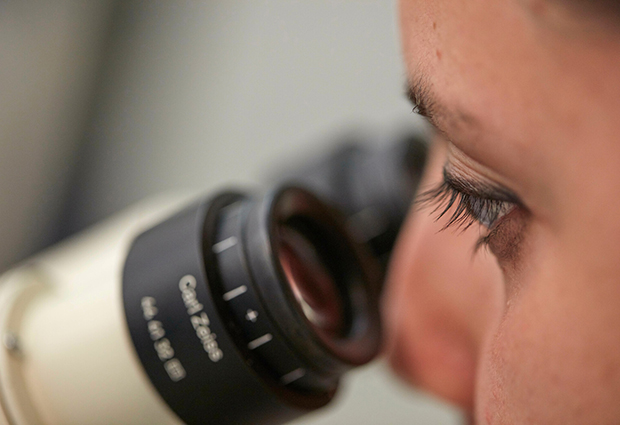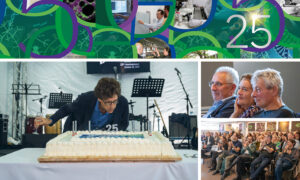
Careers after EMBL
For many students in the life sciences, finishing a PhD marks a professional crossroads

A PhD is traditionally seen as a preparation for an academic career. Monitoring carried out by EMBL’s Internal Training shows that this is indeed the path that the majority of EMBL graduates choose to follow. However, some students will continue their career outside the classic academic pathway, which offers a broad spectrum of opportunities. Towards the end of their training, PhD students will have to decide whether to pursue the traditional academic career, or whether their skills and interests better align with other options.
“In general, people tend to question their life and career choices at important turning points,” says Matija Grgurinovic, Graduate Recruitment and Operations Manager in EMBL’s International PhD Programme. “This means that students in the final year of their PhD tend to be hesitant about their career decisions.”
This sparked Matija’s interest in exploring the role of the inner drives that influence the career decisions of PhD students in their final year, and became the topic for his master’s thesis in human resources and organisational psychology.
Identity and choices
Based on interviews with EMBL PhD students, Matija studied the elements that formed their self-perceived ‘career identity’. “Our values, motives, norms, and goals – the things that define us as a person – influence many areas of our life, including our career choices,” says Matija. “Career development theories argue that knowing who we are and what we want is crucial if we acknowledge the importance that career satisfaction has for one’s overall quality of life.” The purpose of his study was to further understand how career identity is self-perceived by students and whether this might influence their decisions to choose an academic or non-academic career path.
Matija noticed that most of the students shared similar goals and motives. From an early age, commitment, curiosity, and the need for achievement were the common characteristics that attracted students to get involved in science. Family, role models, and the social environment were also important factors that shaped career identity.

However, as students progressed towards the end of their studies, they often started to question their drive for a career in academia. “There is often a mismatch between initial expectations and the reality of working in science; students often stated that publications are the currency in science and this influences the work you can do. Being a good scientist doesn’t mean that you will be successful, because you might not get funding for the topic you want to pursue,” says Matija. Various additional factors such as long working hours, short-term contracts, and a highly competitive environment sometimes discourages students from remaining in academia.
On the other hand, participants in the study stated that the scientific community at EMBL constituted a very strong element of support. This was especially important when students faced self-doubt or pressure. The community provided them with a feeling of identity and they felt proud to be part of it.
Looking beyond the labels
It’s EMBL’s Career Day 2019, and an EMBL alumnus is describing his first-hand experience of making career decisions. In a short presentation, Henning Falk shows the audience the steps of his scientific education. Its structure is classic: bachelor’s and master’s degrees in molecular biotechnology at Heidelberg University, and a PhD acquired in the Aulehla group at EMBL. But where to go from there?
“For me, the most difficult thing in the beginning was to find out what was possible to do,” Henning says. “I saw myself labelled as a biologist with a certain interest in developmental biology and certainly some experience in microscopy. If you type that into LinkedIn, you’re not going to find a job with this as a title.” Henning’s strategy was to figure out what he really enjoyed doing: microscopy and tool development. His search led him to Intuity Media Lab, a company that provides innovation consulting for businesses. Initially, it was their 3D printer for organic tissue that caught his attention. Now, Henning works on his current project: a small automatic microscope, attached to a neural network that detects specific features in a sample. His job includes planning, assembling the microscope, working on the software, and coordinating the project.
“What really helped me in making the switch was looking beyond the labels and not thinking ‘I’m a biologist, I need a job for a biologist,’” Henning says as he closes his speech. “Instead I looked at what I enjoyed doing and what I did well, and tried to find a combination of these things in a job.”
Preparing for the future
Similar to Henning, many students interviewed by Matija were undecided about their career path at the end of their PhD. What surprised Matija was that, despite the perceived challenges, many students saw academia as the model of a successful career. This perception could be influenced by the strong academic values of the scientific community, which sees a PhD in the life sciences as preparation for a career in academia. “It also indicates that students might not be aware of the full range of career options, and that supervisors may not feel able to mentor students for non-academic careers,” says Matija.
In its conclusion, Matija’s study recommends that better guidance for PhD students should be established through career counselling services. Such a service has recently been launched at EMBL, with personalised career advice sessions available to PhD students and postdocs across all EMBL sites.
Careers for life scientists outside academia are very diverse and can be found in areas such as science communication, science policy, the pharmaceutical industry, or healthcare consultancy. This is why the study also sees the need to broaden the definition of a successful scientific career and acknowledge careers that diverge from the traditional scheme, which is aimed at a group leader position and ultimately tenure. PhD students should take advantage of training in transferable skills, and their supervisors should know where students can find advice on various career paths.
Despite the difficulties in deciding their next career step, all students interviewed by Matija were satisfied with having done their PhD at EMBL. “They were all confident that what they had achieved here would be very good for their career and would open many doors,” says Matija.



